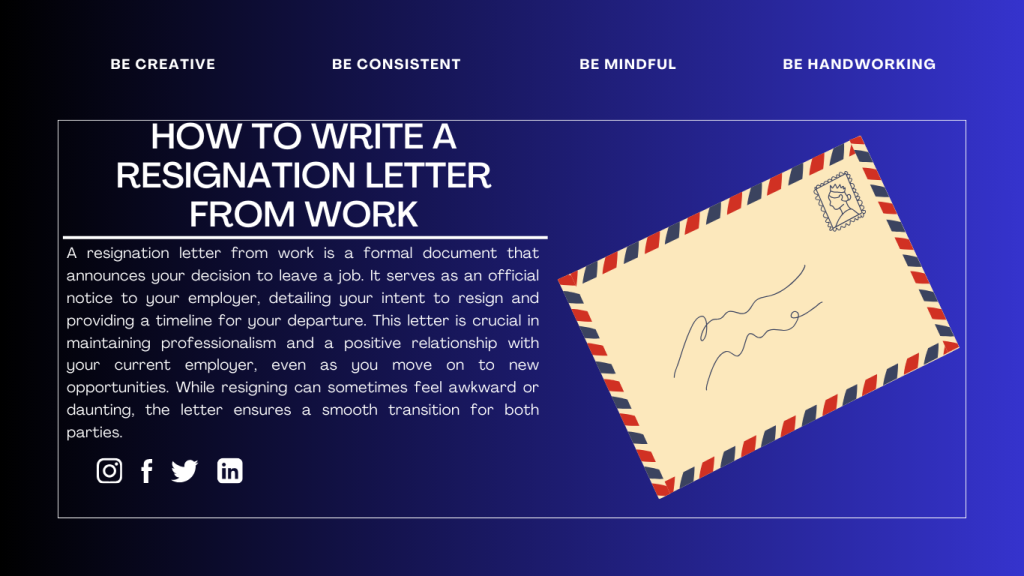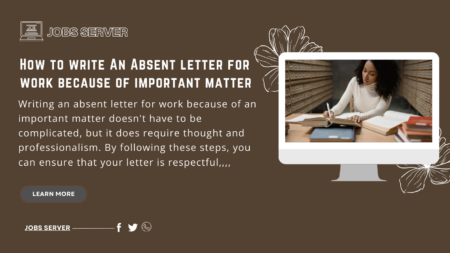Table of Contents
ToggleWhat Is a Resignation Letter from Work?
A resignation letter from work is a formal document that announces your decision to leave a job. It serves as an official notice to your employer, detailing your intent to resign and providing a timeline for your departure. This letter is crucial in maintaining professionalism and a positive relationship with your current employer, even as you move on to new opportunities. While resigning can sometimes feel awkward or daunting, the letter ensures a smooth transition for both parties.
Introduction
Leaving a job is a significant life decision, and how you handle that departure can impact your career. The resignation letter from work isn’t just a routine formality. it’s an opportunity to leave a positive final impression. Whether you’re leaving for a new opportunity, personal reasons, or something else entirely, crafting a well-written resignation letter is crucial for preserving your professional relationships and ensuring that you exit on good terms.
Think of it this way: when you start a new job, you do everything to make a strong impression. The resignation letter is your chance to leave with that same energy, ensuring your employer respects your professionalism long after you’re gone.

When I left my first corporate job, writing my resignation letter felt like a big step. I wanted to balance being respectful and straightforward, without burning bridges. Reflecting on that experience, I’ll walk you through how to write a solid resignation letter, sharing lessons I learned along the way.
Importance of Writing a Resignation Letter from Work
Writing a resignation letter isn’t just a professional courtesy; it’s essential for several reasons:
- It Show Professionalism: A well-structured letter shows you value professionalism and are serious about the transition.
- It Reveals Some Clarity: It provides a clear timeline for your departure, helping the company prepare for your absence and organize a replacement or transition.
- Documentation: A resignation letter serves as an official record of your decision to leave, which can be important if there are legal or contractual obligations involved.
- It Maintaining Relationships Employer: By leaving respectfully, you preserve relationships with your employer and colleagues, which could benefit you down the line (think recommendations or networking).
- It Leaves you With a Smooth Transition: It helps your team or manager manage expectations and workload during your notice period.
When I transitioned from my second job to freelancing, I underestimated how important the resignation letter would be. I thought, “I’ve had conversations with my manager, so why bother with the formalities?” But writing it made the transition much smoother for everyone and left the door open for future collaborations.
Step By Step On How To Write A Resignation Letter From Work
Writing a resignation letter may seem straightforward, but following a clear structure can help ensure you hit all the right points while remaining respectful and professional.
1. Always Start with a Polite Opening
Your resignation letter should begin on a positive note. Address your direct manager or supervisor by name and offer a polite greeting.
Example: “Dear [Paul],”
This keeps things professional right from the start and sets the tone for the rest of the letter.
2. Next, State Your Intention to Resign Clearly
The next step is to clearly state that you’re resigning from your position. Avoid being vague, and get straight to the point without sounding abrupt. This part of the letter should be clear and direct so there’s no confusion about your decision.
E.g.: “I am writing to formally resign from my position as [Job Title] at [Company Name], effective [Your Last Day].”
Make sure you specify your last working day. The standard is to give at least two weeks’ notice, but depending on your contract or industry, this might differ.
3. Thirdly, Express Gratitude for the Opportunity They Gave You
Even if you’re leaving because of dissatisfaction, it’s a good idea to express appreciation for the opportunity you had at the company. Mention any valuable experiences or skills you gained during your time there. A little gratitude goes a long way in maintaining a positive relationship.
Example: “I want to take this opportunity to thank you for the chance to work with such a dedicated and talented team. Over the past [timeframe], I’ve gained invaluable skills and experiences that I will carry with me throughout my career.”
4. Offer to Assist with the Transition
One hallmark of a good resignation letter is offering to help make the transition as smooth as possible. This can mean training your replacement or assisting with final projects. Offering support shows that you care about the company and the team, even as you leave.
E.g.: “I am happy to help in any way I can to ensure a smooth transition during my remaining time, including training my replacement or wrapping up any projects.”
5. Conclude on a Positive Note
End the letter on a positive and forward-looking note. Reiterate your gratitude and express best wishes for the company’s future.
For Instance: “I’ve truly enjoyed working at [Company Name], and I look forward to staying in touch. I wish the team continued success in the future.”
Finally, close with a formal sign-off like “Sincerely” or “Best regards,” followed by your name.
6. Proofread and Examine It Very Well
Before sending your letter, review it carefully. Ensure that it’s free from grammatical errors, typos, and awkward wording. This is your last written communication with the company, so you want it to reflect well on you.
Advantages of Writing a Resignation Letter from Work
A resignation letter from work offers numerous advantages, both personal and professional. Let’s explore some of the key benefits.
1. It Leaves You With A Positive Impression
By submitting a formal letter, you demonstrate respect for the company and your colleagues. This leaves a positive impression and keeps the door open for future networking opportunities.
For instance, when I left my previous role, I had a good relationship with my manager. My resignation letter helped solidify that. A few months later, they recommended me for a project-based role, which turned out to be a fantastic opportunity.
2. It Creates a Clear Exit Timeline
A resignation letter eliminates any ambiguity around your departure. Everyone knows when your last day will be, so the company can begin preparing for your absence.
3. It Documents A Future Reference
Having written documentation of your resignation can be useful down the line. Should any issues arise regarding your exit (e.g., final pay, benefits), you have an official record of your notice and final working day.
4. It Shows Professionalism in Your Career
Resigning professionally adds to your career portfolio. In the future, when you’re being considered for new roles or collaborations, your reputation will speak for you. Leaving on a positive note can boost your professional image.
5. It Gives You Closure
Writing a resignation letter gives you a sense of closure and finality. It’s the official end of your chapter at the company, allowing you to fully embrace your new journey.
Disadvantages of Writing a Resignation Letter from Work
Though a resignation letter is typically beneficial, there are some potential drawbacks to be aware of.
1. Formality in a Casual Environment
In some work cultures, particularly startups or creative industries, the formal structure of a resignation letter may feel out of place. If your workplace is more casual, this formality could seem excessive or overly rigid.
2. Potential for Misinterpretation
The tone of a resignation letter is crucial. A poorly worded letter could be misinterpreted as rude or ungrateful, especially if you’re leaving under difficult circumstances.
3. Limited Space for Honest Feedback
The resignation letter isn’t the place to offer constructive criticism or feedback. Some employees might see this as a missed opportunity to express concerns or dissatisfaction. Instead, feedback should be given in person, such as during an exit interview.
4. Risk of Negative Reactions
In some cases, submitting a resignation letter can trigger a negative response from your employer. If your departure is unexpected or inconvenient, your employer might react poorly to the news, creating tension during your notice period.
Final Thought:
Writing a resignation letter from work is an essential part of leaving a job on a positive note. Whether you’re moving on to new opportunities, going back to school, or making a career change, the letter is your chance to communicate your departure professionally and respectfully.
By following the steps outlined above, you can craft a resignation letter that expresses gratitude, maintains relationships, and sets the stage for a smooth exit. After all, how you leave a job is just as important as how you start one.
When I left my last corporate role, I was nervous about drafting my resignation letter but looking back, I see how critical it was to ensure a graceful exit. It wasn’t just about quitting a job; it was about honoring my time there and paving the way for future opportunities.
So, as you prepare to write your resignation letter, keep in mind the relationships and experiences you’ve built and leave your workplace with the same level of professionalism and respect you brought in when you started.
SOME ASKED QUESTIONS ON HOW TO WRITE A RESIGNATION LETTER FROM WORK
1. What should you include in a resignation letter from work?
A resignation letter should include the basics: your intent to resign, your last working day, a brief thank you to your employer, and an offer to help with the transition. Keep it professional and concise. No need for lengthy explanations.
2. How much notice should I give when resigning?
Typically, a two-week notice is standard. However, it depends on your contract or company policy. Some roles may require a longer notice period, so always check first.
3. Is it necessary to give a reason for resigning in the letter?
No, you don’t have to provide a reason in your resignation letter. If you feel comfortable, you can mention it briefly, but it’s not required.
4. Can I send a resignation letter via email?
Yes, sending a resignation letter by email is acceptable, especially in remote work environments. Just make sure it’s professional, properly formatted, and respectful.
5. How do I write a resignation letter when I’m leaving on bad terms?
Even if you’re leaving under less-than-ideal circumstances, keep the letter professional. Focus on the basics and avoid venting. It’s important to leave with dignity and avoid burning bridges.
6. What should I avoid when writing a resignation letter?
Avoid being overly emotional, criticizing the company, or including too much detail. Stay neutral, and professional, and keep your letter to the point.
7. Should I offer to help train my replacement in a resignation letter?
Yes! Offering to assist with the transition shows professionalism and leaves a good impression. Even if your offer isn’t accepted, it reflects well on your character.
8. Can I retract my resignation after submitting the letter?
It’s possible to retract your resignation, but there’s no guarantee your employer will allow it. It depends on company policy and whether your position has been filled.
9. What’s the best way to start a resignation letter from work?
Start with a polite, direct statement: “I am writing to formally resign from my position as [Your Position], effective [Last Working Day].” Be clear right from the beginning.
10. Do I need to include my contact information in a resignation letter?
It’s not mandatory, but adding your contact information ensures your employer can reach you for any follow-up questions after you leave. It’s a helpful touch, especially for HR records.





